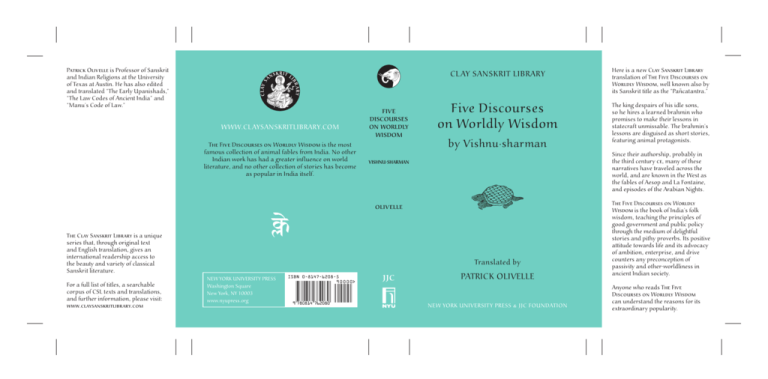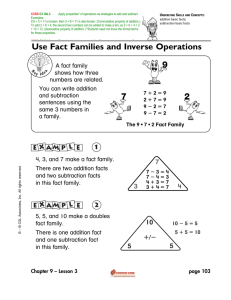
skr it l
cl ay sanskrit library
Here is a new Clay Sanskrit Library
translation of The Five Discourses on
Worldly Wisdom, well known also by
its Sanskrit title as the “Pañcatantra.”
Five Discourses
on Worldly Wisdom
The king despairs of his idle sons,
so he hires a learned brahmin who
promises to make their lessons in
statecraft unmissable. The brahmin’s
lessons are disguised as short stories,
featuring animal protagonists.
ar y
c l ay s
an
ib r
Patrick Olivelle is Professor of Sanskrit
and Indian Religions at the University
of Texas at Austin. He has also edited
and translated “The Early Upanishads,”
“The Law Codes of Ancient India” and
“Manu’s Code of Law.”
www.cl aysanskritlibrary.com
The Five Discourses on Worldly Wisdom is the most
famous collection of animal fables from India. No other
Indian work has had a greater influence on world
literature, and no other collection of stories has become
as popular in India itself.
five
discourses
on worldly
wisdom
by Vishnu∙sharman
Since their authorship, probably in
the third century ce, many of these
narratives have traveled across the
world, and are known in the West as
the fables of Aesop and La Fontaine,
and episodes of the Arabian Nights.
vishnu∙sharman
olivelle
The Clay Sanskrit Library is a unique
series that, through original text
and English translation, gives an
international readership access to
the beauty and variety of classical
Sanskrit literature.
For a full list of titles, a searchable
corpus of CSL texts and translations,
and further information, please visit:
www.claysanskritlibrary.com
Translated by
NEW YORK UNIVERSITY PRESS
Washington Square
New York, NY 10003
www.nyupress.org
jjc
PATRICK OLIVELLE
new york universit y press & jjc foundation
The Five Discourses on Worldly
Wisdom is the book of India’s folk
wisdom, teaching the principles of
good government and public policy
through the medium of delightful
stories and pithy proverbs. Its positive
attitude towards life and its advocacy
of ambition, enterprise, and drive
counters any preconception of
passivity and other-worldliness in
ancient Indian society.
Anyone who reads The Five
Discourses on Worldly Wisdom
can understand the reasons for its
extraordinary popularity.
THE CLAY SANSKRIT LIBRARY
FOUNDED BY JOHN & JENNIFER CLAY
GENERAL EDITOR
RICHARD GOMBRICH
EDITED BY
ISABELLE ONIANS
SOMADEVA VASUDEVA
WWW.CLAYSANSKRITLIBRARY.COM
WWW.NYUPRESS.ORG
C S L
T. P.Olivelle. (csl–.)
A : ..
P̃.
V .
c by the CSL.
Copyright All rights reserved.
First Edition .
The Clay Sanskrit Library is co-published by
New York University Press
and the JJC Foundation.
Further information about this volume
and the rest of the Clay Sanskrit Library
is available on the following websites:
www.claysanskritlibrary.com
www.nyupress.org
ISBN-: ----
ISBN-: ---
Artwork by Robert Beer.
Typeset in Adobe Garamond at 10.25 : 12.3+ pt.
Printed in Great Britain by St Edmundsbury Press Ltd,
Bury St Edmunds, Suffolk, on acid-free paper.
Bound by Hunter & Foulis, Edinburgh, Scotland.
C S L
T. P.Olivelle. (csl–.)
A : ..
P̃.
V .
the five discourses
on worldly wisdom
by Vis.n
. uśarman
TRANSLATED BY
PATRICK OLIVELLE
NEW YORK UNIVERSITY PRESS
JJC FOUNDATION
C S L
T. P.Olivelle. (csl–.)
A : ..
P̃.
V .
Contents
Sanskrit alphabetical order
CSL conventions
FIVE DISCOURSES ON WORLDLY WISDOM
Introduction
The Prelude to the Story
B I O C D A
On Causing Dissension among Allies
The Monkey That Pulled the Wedge
The Jackal That Tried to Eat a Drum
The Adventures of an Ascetic
The Ascetic and the Rogue
How the Battling Rams Killed the Greedy
Jackal
Story . A Weaver Cuts the Nose of a Bawd
Story How the Crows Killed the Snake
Story . The Crab Cuts Off the Heron’s Head
Story
The Hare That Outwitted the Lion
Story How the Louse Got Killed Trying to be Nice
to a Bug
Story How the Lion’s Servants Got the Camel
Killed
Story
How the Sandpiper Defeated the Ocean
Story . The Turtle and the Geese
Book I
Story
Story
Story
Story .
Story ..
C S L
T. P.Olivelle. (csl–.)
A : ..
P̃.
V .
Story . The Fate of Three Fish: Farsighted,
Quick-witted, and Inevitable
Story The Bird That Tried to Advise a Monkey
Story Two Friends and Betrayed Trust
Story . How the Mongooses Ate the Heron’s
Chicks
Story The Iron-Eating Mice
B II O S A
Story
The Ascetic and the Mouse
Story . The Woman Who Traded Sesame
for Sesame
Story .. How the Greedy Jackal Died Eating
a Bowstring
Story
How Chitránga Got Caught in a Trap
B III O W P:
C O
Story
The Ass in a Leopard’s Skin
Story
The Owl is Elected King of Birds
Story . The Hare Bluffs the Elephant
Story . Partridge and Hare Take Their Case to
the Cat
Story
How the Rogues Tricked the Brahmin
Story The Old Merchant and His Young Wife
Story
The Thief, the Ogre, and the Brahmin
C S L
T. P.Olivelle. (csl–.)
A : ..
P̃.
V .
Story
Story
Story
How the Unfaithful Wife Tricked Her
Foolish Husband
The Mouse That Turned into a Girl
Frogs Go for a Ride on the Back of
a Snake
B IV O L W Y H G
Story
The Ass Without Ears or a Heart
B V O H A
Story
Building Castles in the Air
Story
The Barber Who Killed the Monks
Notes
Glossary
Index
A sandhi grid is printed on the inside of the back cover
C S L
T. P.Olivelle. (csl–.)
A : ..
P̃.
V .
C S L
T. P.Olivelle. (csl–.)
A : ..
P̃.
V .
Book III
On War and Peace:
The Story of
the Crows and the Owls
C S L
T. P.Olivelle. (csl–.)
A : ..
P̃.
V .
’ ̂ ̄ sam
. dhi A vigraha A sam
. bandham
.
kāk’ A ôlūkı̄yam
nāma
tr
tı̄yam
tantram,
yasy’
âyam
ād.
.
.
yah. ślokah.:
a
na viśvaset pūrvaAvirodhitasya
śatroś ca mitratvam upāgatasya;
dagdhām
.
. guhām
. paśyata ghūkaApūrn.ām
kākaApran.ı̄tena hut’Aâśanena. []
rājaAkumārā ūcuh.: «katham
. c’ âitat?» Vis.n.uśarm” āha:
asti, kasmim
. ś cid van’ A ôddeśe mahān nyagrodha A vr.ks.ah.
snigdha A bahala A parn.a A gulma A chāyayā sv A āgatam iv’ âdhva A
gānām
. prayacchati. tatra Meghavarn.o nāma vāyasa A rājah.
prativasati sma, kākaAsahasraAparivārah..
.
tatra n’ âtiAdūra ulūkaAsahasraAparivārah. Arimardano nām’
ôlūkaArājaś ca prativasati sma. sa c’ âikadā sahaAjaAvair’Aânuśayād ulūk’AôpalabdhaAdurgaAvr.tt’Aântah. KālaAbalaAśaktyā rātrāv
āgatya, mahat” ôlūkaAsam
. ghātena tasy’ ôpari sam
. nipatitah..
mahac ca tes.ām
. kākānām
. kadanam
. kr.tvā, apayātah..
anye A dyuś ca prabhāta A samaye hata A śes.ān bhagna A cañcu A paks.a A caran.ān anyām
. ś ca sametya, śivir’ A ânusāra A pravicay’Aôpalabdhim
kr
tvā,
mantribhih. s’Aârdham
. .
. Meghavarn.o
mantrayitum ārabdhah.. «pratyaks.am etan mahad viśasanam
asmākam
. saApatnena Arimardanena kr.tam. dr.s.t.aAdurgaAmārgo ’sāv avaśyam adya rātrau labdh’Aâvasaro ’smadAaAbhāvāya
C S L
T. P.Olivelle. (csl–.)
A : ..
P̃.
V .
the Third Book, named “The Story
of the Crows and the Owls Illustrating War and
Peace.” This is its opening verse:
W
In a man you have once antagonized,
Or in a foe who has become a friend,
you should never place your trust.
See how the hideout filled with owls was burnt,
by the fire carried by crows. []
The princes asked: “How did that happen?” Vishnu·sharman narrated this story.
In a certain forest there was once a large banyan tree. It
appeared to offer words of warm welcome to travellers with
its cooling shade under its abundant foliage and cluster of
trunks. In that tree lived a king of crows named Megha·varna, the Cloud-colored, with a retinue of a thousand crows.
Not too far from that tree there also lived a king of owls .
named Ari·márdana, the Crusher-of-Foes, with his retinue
of a thousand owls. Ari·márdana had learned all about Megha·varna’s fortress from his owls. One day, driven by his
inborn enmity towards crows, he came at night with a large
squadron of owls and attacked Megha·varna with a force as
formidable as Death itself. After inflicting a terrible massacre
on the crows, he departed.
The next morning Megha·varna assembled the crows that
had escaped the slaughter, many with broken beaks, wings,
and feet, and received a report on the condition of the camp.
Then he opened a meeting of his ministers to obtain their
counsel, telling them: “You see before your very eyes the
massacre inflicted on us by our enemy Ari·márdana. Now
C S L
T. P.Olivelle. (csl–.)
A : ..
P̃.
V .
punar es.yati. tad aAhı̄naAkālam upāyaś cintyatām
. tadAvighāto
yathā bhavat’ ı̂ti.» evam uktvā, ek’Aântı̄Abhūtah..
atha tasy’ ânvayaAparam
. Apar”Aāgatah. pañca sacivās tis.t.hanti. tad yathā: Ud.d.ı̄vı̄, Sam
. jı̄vı̄ c’
. d.ı̄vı̄, Ād.ı̄vı̄, Prad.ı̄vı̄, Ciram
êti. tān pratyekam
. pras.t.um ārabdhah..
tes.ām ādāv Ud.d.ı̄vinam
. pr.s.t.avān: «bhadra, evam avasthite, kim anAantaram
. karan.ı̄yam
. manyase?»
so ’bravı̄t: «kim
. may” âbhyadhikam
. kim
. cij jñāyate? deva,
yad eva śāstre ’bhihitam, tad eva vaks.yāmi. kim
. tu balavatā
vigr.hı̄tasya tadAanupraveśo videśaAgamanam
. v” êti.»
.
tac chrutvā, Sam
.
. d.ı̄vinam āha: «bhadra, bhavān katham
manyata iti.»
sa āha: «deva, yad ev’ ânen’ âbhihitam: ‹balavatā vigr.hı̄tasya videśaAgamanam iti,› tan n’ âAkasmād ekaApada eva durgaA
parityāgah. kāryah.. yato yuktam evam
. sthite, dolā A vyājena
kālam
. yāpayitum. yadā bhayam
. bhavis.yati, tad” âpayānam
.
karis.yāmah.. yadā svāsthyam, tadā durga eva sthāsyāma iti.»
C S L
T. P.Olivelle. (csl–.)
A : ..
P̃.
V .
:
that he has discovered the way into our fortress, given the
opportunity, he is sure to return tonight to finish us off. So
without delay we must think of a strategy to thwart him.”
After saying this he withdrew to a secluded spot.
Megha·varna had five ministers who had inherited the
office, succeeding their forefathers. They were: Uddı́vin,
the High-flyer, Sandı́vin, the Joint-flyer, Adı́vin, the Backward-flyer, Pradı́vin, the Onward-flyer, and Chirañ·jivin,
the Long-lived. Megha·varna began to question each of
them in turn.
The first one he questioned was Uddı́vin: “What do you
think, my friend? Under these circumstances, what should
we do now?”
Uddı́vin: “Am I a person who would know anything
of special value? Your Majesty, I can only tell you what is
written in the authoritative texts on the subject. When a
person is attacked by someone stronger, he has only two
options. He can either surrender to the other or go into
exile.”
After listening to him, Megha·varna asked Sandı́vin: “And .
you, my friend, what do you think?”
Sandı́vin: “This fellow’s advice, Your Majesty, is that
when a person is attacked by someone stronger, he should
go into exile. My response is that one should not abandon one’s fortress suddenly and without cause. The proper
thing to do under the current circumstances is to bide our
time following an on-again-off-again strategy. When danger threatens, we will flee. But so long as things are normal,
we will remain right here in the fortress.”
C S L
T. P.Olivelle. (csl–.)
A : ..
P̃.
V .
tatas tasy’ âpi vacanam avadhārya, Prād.ı̄vinam
. pr.s.t.avān:
«bhavato ’tra ko ’bhiprāyah.?»
so ’bravı̄t: «rājan, ātyayikam idam anAavaratam
. gat’AāgataAkaran.am. dı̄n’AândhaAkubjaAvāmanaAkun.iAkhañjaAvyādhit’A
ôpaskar’Aādibhir nayan’Aānayanair eva vayam
. vinas.t.āh.. yata
evam
. gate, sam
. dhir eva śreyasAkara iti. yat kāran.am:
pravr.ddhaAcakren.’ ākrānto
rājñā balavat” âAbalah.
sam
. dhino ’pakramet tūrn.am
.
kośaAdan.d.’AātmaAbhūtaye. []
.
yatas tes.ām
. sam
. natim
. kr.tvā, sukham anudvignā ih’ âiva
sthāsyāma iti.»
tasy’ âpi vacanam avadhārya, Ād.ı̄vinam
. pr.s.t.avān: «bhadra, evam avasthite, asmākam
kim
prāpta
Akālam
.
.
. manyase?»
sa āha: «varam aran.ye harin.a A romantha A kas.āyān.y ambhām
. sy āsevitāni, na ca prabhutvaAras’Aāsvādinah. par’Aôpasthāne kr.pan.aAjı̄vitam iti. api ca:
jyāyān na named aAsame;
’Asam’Aôpanamanam
. mahat kas.t.am.
garhitam etat pum
sām
.
atiAnamanam
sāhasa
Adhanānām. []
.
C S L
T. P.Olivelle. (csl–.)
A : ..
P̃.
V .
:
Megha·varna listened to him and then asked Pradı́vin:
“What is your view on the matter?”
Pradı́vin: “To be constantly going back and forth, Your
Highness, would be suicidal. We will all be destroyed if
we have to carry back and forth everything—the weak, the
blind, the cripples, the dwarfs, the maimed, the lame, the
sick, and all our belongings. So, under the circumstances,
the best thing to do is to sue for peace. And the reason is
this:
When a strong king attacks with powerful troops,
The weaker king should promptly sue for peace,
To save his assets, army, and himself. []
So, we should make peace with them and continue to .
live right here in comfort and free from anxiety.”
Megha·varna listened to his advice also and then asked
Adı́vin: “And you, my friend, what do you think is the
appropriate thing for us to do under these circumstances?”
Adı́vin: “For those who have tasted the sweet flavor of
sovereignty, it is far better to live in the wilderness drinking water dirtied by the cud the deer chew than to lead a
wretched life in the service of an enemy. Furthermore,
A superior should never bow to one
who is not his peer;
To bow to people who are not one’s peers
is a great disgrace.
To yield so readily is unworthy
Of real men, for whom valor is wealth. []
C S L
T. P.Olivelle. (csl–.)
A : ..
P̃.
V .
api ca:
.
dan.d.ānām iva namatām
.,
pum
. sām
. chāyā vivr.ddhim upayāti.
ks.ayam eti c’ âtiAnamatām
.
tasmāt pran.amen na c’ âtiAnamet. []
taiś ca sah’ âsmākam
. sam
. darśanam eva na vidyate. sam
.darśanena vinā katham
. sam
. dhir bhavis.yati? tat sarvathā yuddham eva nas taih. saha pus.kalam iti.»
tato Meghavarn.as tes.ām
. caturn.ām api pr.thak pr.thag
abhiprāyam
. jñātvā, Ciram
. A jı̄vinam āha: «tāta, tvam asmākam
. cirantano ’nvay’Aāgatah. sacivah.. ajasram
. ca hit’Aânves.ı̄.
kim evam avasthite ’pi, adhunā prāptaAkālam
. manyase? yac
ca tvam
. brūs.e, tad eva nah. śreyasAkaram iti.»
evam ukte, Ciram
. jı̄vy āha: «deva, kim ebhir n’ ôktam asti,
yatra mama vacan’Aâvakāśah. syāt? iha hi sam
. dhiAvigrahayoh.
sam
. dhir vā vigraho vā tau pūrv’ A ôktāv eva. tath” âpi yad
Ād.ivin” âbhihitam, tat paks.a A vyāvartanāy’ ôcyate. bhadra,
katham es.ām asmākam
. ca yuddham
. sāmānyam? tāvad aAsādhāran.am
. yuddham asmākam. sarvathā te balavantah.. tatas
taih saha na yuddham asmākam ucitam. tathā ca:
C S L
T. P.Olivelle. (csl–.)
A : ..
P̃.
V .
:
And again,
.
A man’s shadow will lengthen when he bows,
as a stick’s when it’s bent.
But it disappears if you bend too much;
So you should bow, but never bow too much. []
There is no common interest at all between the owls
and us, and without such a common interest, how can we
negotiate a peace? Considering everything, therefore, war is
the best option for us.”
Megha·varna, after taking stock of the views of all four of
them one by one, then said to Chirañ·jivin: “Father, you are
our most senior hereditary minister, and you always have
our welfare at heart. Under the current circumstances what
do you think is the appropriate thing for us to do at this
point? Whatever you say will clearly be the best course for
us.”
So petitioned, Chirañ·jivin replied: “What is there for me
to say, Your Majesty? Haven’t they already said everything?
Between the alternatives of war and peace, we have already
heard arguments in favor of pursuing the one and the other
in the current circumstances. The advice of Adı́vin, however,
would lead to the complete rout of our side. How, my friend,
can there ever be an equal fight between us and the owls?
Clearly, in any fight our side will come up short. They are
more powerful in every way. So it will be unwise of us to
start a war with them. As it is said:
C S L
T. P.Olivelle. (csl–.)
A : ..
P̃.
V .
pares.ām ātmanaś c’ âiva
yo ’Avicārya bal’AâAbalam
kāryāy’ ôttis.t.hate mohād,
vyāpadah. sa samı̄hate. []
.
laghus.v api vidhātavyam
.
gauravam
. paripanthis.u,
kr.tyAantaraAvidhātr̄.n.ām
.
bhavanti hy aAphalāh. kriyāh.. []
ks.amāvantam arim
. prājñam
.
kāle vikramaAsevinam
par’AātmaAgun.aAdos.aAjñam
anusmr.tya na viśvaset. []
yam ev’ âbhyupayāti Śrı̄r
upāyaAparitos.itā,
nirAudvignā hi tatr’ āste,
na karaAgrahaAdūs.itā. []
śātayaty eva tejām
. si
dūraAstho ’py unnato ripuh.;
s’Aāyudho ’pi nikr.s.t.’Aātmā
kim āsannah. karis.yati? []
C S L
T. P.Olivelle. (csl–.)
A : ..
P̃.
V .
:
When, without weighing the relative strengths
And weaknesses of yourself and your foes,
You go rushing rashly into action,
you’re courting disaster! []
.
Show great respect even to minor foes;
if you act otherwise,
your efforts are in vain. []
An enemy who is patient and wise,
Who resorts to force at the proper time,
Knows his and his foe’s strengths and weaknesses—
Be watchful, never place your trust in him. []
When Fortune betakes herself to a man,
Pleased by the sound policies he pursues,
She will remain with that man, undisturbed;
Her marriage to him will bring her no shame.* []
Even from afar, an exalted foe
Is sure to eclipse a man’s majesty.
Even though he is near and fully armed,
what can a petty man do? []
C S L
T. P.Olivelle. (csl–.)
A : ..
P̃.
V .
na bhı̄to, na parāmr.s.t.o,
n’ âpayāto, na varjitah.,
n’ âAśastro ’py avamantavyo,
n’ âiko v” êti nay’Aâdhikaih.. []
.
yasya sidhyaty aAyatnena
śatruh., sa vijayı̄ narah.;
ya ekataratām
. gatvā
jayı̄, vijita eva sah.. []
siddhim
. vañcanayā vetti,
parasAparaAvadhena vā.
nirAupāyam
..
. sukham
. sv’Aântam
dvayoh. kim? iti cintyatām! []
mad’Aâvaliptaih., piśunair,
lubdhaih., kām’Aātaṅkaih., śat.haih.
darp’Aôddhataih., krodhaAparair
dan.d.aAnı̄tih. suAdurAgrahā. []
iyam
. tv aAbhinnaAmaryādaih.,
svAanuśis.t.aih., kr.t’Aātmabhih.,
sarvam
. Asahair, upāyaAjñair,
aAmūd.hair eva dhāryate. []
tat sarvathā yuddham eva na śreyas A karam iti. kasmāt?
jyāyasā virodho hastinā pādaAyuddham iv’ âik’AântaAvināśāya.»
C S L
T. P.Olivelle. (csl–.)
A : ..
P̃.
V .
:
Whether he’s frightened or is beaten up,
Whether he’s in flight or is abandoned,
Whether he’s unarmed or is all alone,
You should never humiliate a man;
So state the experts in sound policy. []
When his enemy yields without a fight,
he’s a victor indeed.
Winning after an uncertain battle,
is truly a defeat. []
.
There are two ways one can achieve success:
mutual slaughter or guile.
Prosperity without sound policy
brings about one’s own death.
Consider which of the two you should choose. []
People who are haughty and malicious,
Who are greedy, deceitful, full of lust,
Who are prone to anger, puffed up with pride—
Such people find it difficult to grasp
the proper way to rule. []
It can be grasped, but only by those men
Who stay within bounds and have been taught well,
Well-disciplined, whose patience knows no bounds,
Who are skilled in policy and are wise. []
So, it is absolutely clear that war is not to our advantage.
And the reason is simple. Picking a fight with someone
stronger is like a foot-soldier fighting with an elephant—
you are sure to end up dead.”
C S L
T. P.Olivelle. (csl–.)
A : ..
P̃.
V .
.
Meghavarn.a āha: «tāta, kathaya! kim
. nis.pannam?»
so ’bravı̄t: «bhadra, sam
. pradhāryatām etat. uktam
. ca:
yā hi prān.aAparityāgaA
mūlyen’ âpi na labhyate,
sā Śrı̄r mantraAvidām
. veśmany
anAāhut” âpi dhāvati. []
kramen.a yah. śāstraAvido
hit’Aâis.in.ah.
kriyāAvibhāge suAhr.do
na pr.cchati.
<. . . > []
deśam
. balam
. kāryam upāyam āyuh.
sam
. cintya yah. prārabhate svaAkr.tyam,
mah”Aôdadhim
. nadya iv’ âbhipūrn.am
.
tam
sam
padah
sat
A
purus
am
bhajante.
[]
.
.
.
. .
.
śūrāh., sarv’AôpadhāAśuddhā,
buddhimanto, vicaks.an.āh.
sahāyāh. syur; nr.Apatvam
. hi
satAsahāyaAnibandhanam. []
vis.ān.aAsam
. ghat.t.aAsamutthit’AânalaA
sphuliṅgaAmāl”Aākulite ’pi dantinām
ran.e ’pi pı̄tvā tu yaśām
. si vidvis.ām
.,
bhavaty aAvidvān na hi bhājanam
. śriyah.. []
C S L
T. P.Olivelle. (csl–.)
A : ..
P̃.
V .
:
Megha·varna: “Tell me, father. What will be the out- .
come?”
Chirañ·jivin: “Think about this, my friend. It is said:
Even at the price of losing one’s life,
Fortune cannot be won;
Yet if you have strategic acumen,
Uninvited she will run to your house. []
Not methodically seeking advice
regarding your pursuits,
From well-read friends of yours who wish you well,
<can only lead to grief>. []*
‘What is this place like? What are my forces?
What’s to be done? What’s the right strategy?
what’s the state of my life?’
When he embarks on a course of action,
after weighing these points,
Good Fortunes chase after that sterling man
Like rivers, the ocean filled to the brim.* []
.
Assistants should be brave, prudent, and wise,
of proven loyalty;
For, without the help of good assistants,
no king can ever rule. []
Though he has drunk the glory of his foes,
In battles garlanded by fiery sparks,
Flying from the striking of elephant tusks,
Fortune visits not an ignorant man. []
C S L
T. P.Olivelle. (csl–.)
A : ..
P̃.
V .
tat sarvathā gun.avatAsahāyaAparigraho vijigı̄s.ūn.ām ek’AântaAsiddhaye. uktam
. ca:
na vam
. gun.am
.,
. śaAmārgaAkramaAlaks.an.am
nirı̄ks.ate n’ âiva vapur, na c’ āgamam;
ya eva śūrah. suAsahāyavān naras,
tam eva Laks.mı̄ś capal” âpi sevate. []
gun.es.v ādhāraAbhūtes.u
phale kasy’ âsti sam
. śayah.?
nyastaś c’ ātmā satām
. vr.tte
vibhūtiś ca na durAlabhā. []
.
‹api kı̄rtyAartham āyānti
nāśam
. sadyo ’tiAmāninah.?
na c’ êcchanty aAyaśoAmiśram
apy ev’ ānAantyam āyus.ah..› []
‹jayāy’ ôtks.ipyatām
. pādo
daks.in.ah. kim
vicāryate?
.
mūlam
. hi prāhur ācāryā
dı̄rghaAsūtratvam āpadām.› []
śrut’Aâpaviddhair etair vā
vr.thā kim
. śukaAbhās.itaih.?
prājñas tvam
. , tyajyatām
. maunam
.;
yasya velā, tad ucyatām! []
C S L
T. P.Olivelle. (csl–.)
A : ..
P̃.
V .
:
To ensure complete success, a man intent on conquest
must always surround himself with excellent assistants. For
it is said:
Fortune, fickle though she is, regards not
Fine ancestry, great learning, or good looks,
as marks of excellence;
She waits only on a man who is brave,
and has good attendants. []
When a man is anchored
On the principles of sound policy,*
Is there any doubt that he will succeed?
And when he follows the path of good men,
Prosperity is not hard to obtain. []
.
‘Do not proud men lay down their lives forthwith
for the sake of fame?
They yearn not even for unending life
mixed with infamy.’ []
‘Step forth with your right foot for victory;
why do you still hesitate?
Procrastination, the teachers declare,
is the root of misfortune!’ []
Parrots’ prattle! Forget all such dribble,
dismissed by learned men!
You are wise. Don’t be silent any more.
When the time has come, tell what must be done. []
C S L
T. P.Olivelle. (csl–.)
A : ..
P̃.
V .
‹mantraAmūlam
. hi vijayam
.›
pravadanti manı̄s.in.ah.;
mantrasya punar ātmā ca
buddhiś c’ āyatanam
. param. []
s.ad. eva khalu mantrasya
dvārān.i tu nar’Aâdhipa;
viditāny eva te, tāta,
kı̄rtayis.yāmi kı̄rtiman: []
.
ātmānam
. ca,
. , mantriAdūtam
channam
,
tri
A
s
avan
a
A
kramam,
.
. .
ākāram
. bruvate s.as.t.ham;
etāvān mantraAniścayah.. []
aAsam
. gr.hı̄tasya punar
mantrasya śr.n.u yat phalam:
aAhı̄nam
. dharmaAkāmābhyām
artham
. prāpnoti kevalam. []
atha vyavasit’Aânujñā,
chedanam
. sam
. śayasya ca,
tasya
ca
jñānam
aAniśam
.
.—
mantrin.ām
. phalam. []
. triAvidham
tad yathā yo mantro visrambhan.am
. gacchati, tathā prayatitavyam. yat kāran.am:
C S L
T. P.Olivelle. (csl–.)
A : ..
P̃.
V .
:
For counsel is the root of victory,
so have wise men declared.
But the highest abode of good counsel
is oneself and one’s mind! []
There are just six ways, we all know, O King,
In which, Glorious King, counsel is betrayed.
Although, son, you already know them all,
I will mention them now. []
.
Oneself, one’s ministers and messengers,
Secret agents and the three daily baths,
The sixth, they say, is facial expressions.
That’s the verdict regarding good counsel. []
But look at the rewards that counsel brings,
when it is not divulged:
One gains singular success in this world,
Without damage to pleasure or virtue.* []
Three are the benefits ministers bring:
They sanction decisions and remove doubts,
Then there’s wisdom, which he can always tap. []
One should always strive to keep the counsel one receives
confidential. And this is the reason:
C S L
T. P.Olivelle. (csl–.)
A : ..
P̃.
V .
mithyā pran.ihito mantrah.
prayoktāram aAsam
. śayam
durAis.t.a iva vetālo
n’ âAnihaty’ ôpaśāmyati. []
.
ātmaApaks.aAks.ayāy’ âiva
paraApaks.’Aôdayāya ca
mantraAdvaidham amātyānām
.
tan na syād iha bhūtaye. []
āyaAvyayau yasya ca sam
. vibhaktau,
channaś ca cāro, nibhr.taś ca mantrah.,
na c’ âApriyam
. mantris.u yo bravı̄ti sa sāgar’Aântām
. pr.thivı̄m
. praśāsti. []
tad evam
. punar bravı̄mi: ‹yuddham
. na śreya iti.› sam
.dhir apy a A śakyo ’rthah. saha A ja A vair’ A ânubandhānām. tad
yadi may” âvaśyam
. mantrayitavam, tad apanı̄yatām ete mantriAmātraAvyapadeśaAkeval’Aôpajı̄vinah. kathāAkuśalāh.. na ca
karan.ı̄yes.v ātyayikes.u s.at. A karn.am
. rahasyam
. phalavad bhavati.»
tathā c’ ânus.t.hite, Meghavarn.a āha: «tāta, bāla A bhāvād
an A abhijño ’smi. yathā bravı̄s.i, tathā karomi. tvad A āyattam
.
hi sarvam idam. tvam adhun” ârthaAvādı̄ jñānaAvijñānaAsam
.pannah. pitr.Akramen.a hit’Aâis.ı̄. kim
. tu kautūhalam ucyatām:
katham
. punar asmākam ulūkaih. saha vairam utpannam?
iti.»
C S L
T. P.Olivelle. (csl–.)
A : ..
P̃.
V .
:
Counsel wrongly applied, like a vampire*
improperly invoked,
Is not pacified until it has killed
the man who employs it. []
.
When ministers give conflicting advice,
It can only lead to his side’s defeat,
And to the triumph of his enemies,
never to his success. []
When one matches one’s income and outlay,
Agents are secret, and counsel concealed,
Says no unkind word to one’s ministers;
One will rule the whole earth up to the sea. []
So, I tell you once more: war is not to our advantage.
Peace, on the other hand, is also an impossible goal for
those who have a natural enmity towards each other. If
you insist that I give you my advice, then send away these
people; they are here to gain a livelihood by their title as
‘Minister’ and are only good at talking. When there are
emergency measures to be taken, secrets heard by six ears
will be ineffective.”
When this request had been carried out, Megha·varna
said to Chirañ·jivin: “Father, I am young and inexperienced.
I will do as you advise; our entire life depends on you. You are
the one who will tell us the truth; you have the knowledge
and the wisdom; and you have my welfare at heart, for you
have served my father before me. But I am curious about
one thing. Tell me, how did this enmity between us and the
owls come about?”
C S L
T. P.Olivelle. (csl–.)
A : ..
P̃.
V .
so ’bravı̄t: «bhadra, vāgAdos.āt.
.
suAciram
. hi caran nityam
.
grı̄s.me sasyam aAbuddhimān
dvı̄piAcarmaApratichanno
vāgAdos.ād rāsabho hatah..» []
so’ bravı̄t: «katham
. c’ âitat?»
Ciram
. jı̄vy āha:
C S L
T. P.Olivelle. (csl–.)
A : ..
P̃.
V .
’
Chirañ·jivin: “It all started because of a stupid comment!
Long did he graze nonstop in the corn fields;
Many a summer day he spent grazing
The fields of corn wearing a leopard’s skin;
But due to a stupid comment he made,
the foolish ass was killed.” []
Megha·varna asked: “How did that happen?”
Chirañ·jivin narrated this story:
C S L
T. P.Olivelle. (csl–.)
A : ..
P̃.
V .
.
skr it l
cl ay sanskrit library
Here is a new Clay Sanskrit Library
translation of The Five Discourses on
Worldly Wisdom, well known also by
its Sanskrit title as the “Pañcatantra.”
Five Discourses
on Worldly Wisdom
The king despairs of his idle sons,
so he hires a learned brahmin who
promises to make their lessons in
statecraft unmissable. The brahmin’s
lessons are disguised as short stories,
featuring animal protagonists.
ar y
c l ay s
an
ib r
Patrick Olivelle is Professor of Sanskrit
and Indian Religions at the University
of Texas at Austin. He has also edited
and translated “The Early Upanishads,”
“The Law Codes of Ancient India” and
“Manu’s Code of Law.”
www.cl aysanskritlibrary.com
The Five Discourses on Worldly Wisdom is the most
famous collection of animal fables from India. No other
Indian work has had a greater influence on world
literature, and no other collection of stories has become
as popular in India itself.
five
discourses
on worldly
wisdom
by Vishnu∙sharman
Since their authorship, probably in
the third century ce, many of these
narratives have traveled across the
world, and are known in the West as
the fables of Aesop and La Fontaine,
and episodes of the Arabian Nights.
vishnu∙sharman
olivelle
The Clay Sanskrit Library is a unique
series that, through original text
and English translation, gives an
international readership access to
the beauty and variety of classical
Sanskrit literature.
For a full list of titles, a searchable
corpus of CSL texts and translations,
and further information, please visit:
www.claysanskritlibrary.com
Translated by
NEW YORK UNIVERSITY PRESS
Washington Square
New York, NY 10003
www.nyupress.org
jjc
PATRICK OLIVELLE
new york universit y press & jjc foundation
The Five Discourses on Worldly
Wisdom is the book of India’s folk
wisdom, teaching the principles of
good government and public policy
through the medium of delightful
stories and pithy proverbs. Its positive
attitude towards life and its advocacy
of ambition, enterprise, and drive
counters any preconception of
passivity and other-worldliness in
ancient Indian society.
Anyone who reads The Five
Discourses on Worldly Wisdom
can understand the reasons for its
extraordinary popularity.









